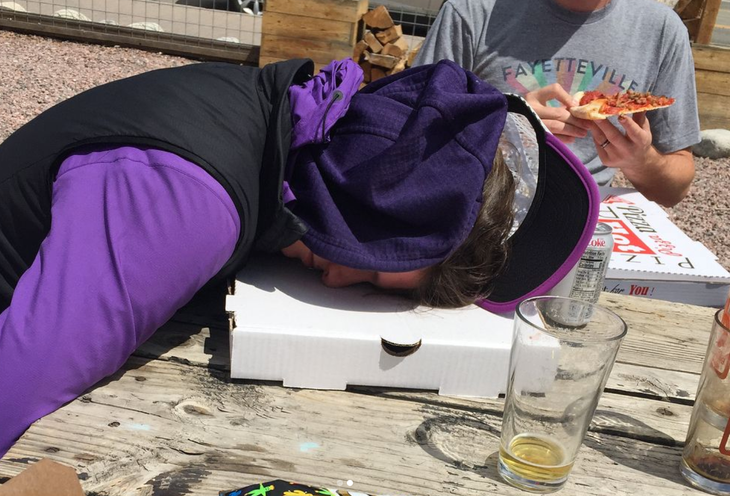Products You May Like
Get access to everything we publish when you
sign up for Outside+.
I didn’t always think of myself as a competitive person.
I felt uncomfortable tying much of myself to competition because in my eyes, I wasn’t good enough to claim it as part of my identity. I felt I lacked the bravado or ability to put myself out there. Competitive people were just born different, with the easy self-assurance that comes from being the kid in gym class that could do 16 pull-ups during the President’s Physical Fitness Test, not the kid whose best event was the Sit and Reach (I am good at sitting).
Who did I think I was? Competitiveness is for people who are good at competing!
Then, I started running trail races.
My first trail race was a sh*tshow. A technical 10k on winding Ozark mountain bike trails. I wore road shoes and fell so often that I walked away with bloody hands reminiscent of the Stigmata. Each kilometer was excruciating. It was a cycle of redlining, then falling, scraping myself out of dense Arkansas brush and pinning it to make up time. I loved every second of it.
Instead of medical attention, I was greeted with a bratwurst and IPA at the finish line. It was 9 AM. I knew these were my people.
I finished in first place, bloody and breathless. I stood at the finish line, clutching my brat and watching other runners spill through the finish chute, their faces full of the emotions that come with exceeding our wildest expectations. No one particularly cared how fast they finished, as long as there were enough high-fives and tube meat to go around. That experience wasn’t memorable because of the win, or the breakfast beer, but because I got my first taste of fully inhabiting that place between who I thought I was, and who I imagined I could be as an athlete.
Trail racing gave me an opportunity to connect with other runners, especially women. Instead of seeing other women as people I was competing against, I saw them as athletes I was competing with. For me to do my best and to reach my potential, I needed them to do the same. In opening up about my own insecurities around racing and competition, I was able to connect with runners navigating the same thing. Standing shoulder to shoulder with other athletes that were racing to push themselves and reach their athletic potential changed me. Seeing them set the bar high, and give their all to meet their own high expectations, showed me that it’s okay to take ownership of lofty goals that might not make sense to everyone else. They weren’t afraid to be seen as competitive, because they were too busy competing. Could I be that brave, too?
I began to see that competition and competitiveness aren’t just about winning or losing, but showing up as your best, and even more importantly, your most authentic self. If you run and race hard enough, you wring out any doubts or pretenses about the kind of person and runner that you can be. It’s about reimagining what you’re capable of, right alongside everybody else.
Competing in trail races shook me out of complacency in other areas of my life. Seeing runners just like me achieve incredible things on and off the trail challenged me to do my best too, and not just in races. I took that excitement about collaboration, digging deep and reaching my potential to work. I took it into relationships. And I take a little bit of it on every trail run.
Most importantly, competition let me see how other runners processed those inevitable less-desirable outcomes. Watching them handle “failure” with grace and self-compassion showed me that I could do the same. Competing means opening yourself up to failure, often in uncomfortably public settings. It means acknowledging that you want something really, really badly, knowing you may not ever get there, and pursuing it with reckless zeal anyway. Letting people see that is hard, but it’s rewarding. Sharing it with other people makes it easier.
Three years after that first trail 10k, I tried to run 100 miles at the Leadville Trail 100. After setting a 50-mile PR (pro tip: DON’T), I DNF’d around mile 86. I had wrung every ounce of myself out only to fail in a way that felt very public, wrapped like a sad burrito in a space blanket on the side of the trail.

If I’m being honest, I think that’s the first time I really competed. I gave my all when nothing was guaranteed, and failure was likely. I learned that you can eat a pizza, cry yourself to sleep and get up the next morning to cheer on your fellow racers with as much conviction and enthusiasm as if it was you shuffling across the finish line. Because somewhere between the start line and a DNF, I learned what bravery really is. And it’s in every runner who pins on a bib or laces up their shoes and tries to go just a bit further and faster than last time.
True competition means rejecting the idea that it’s cool not to care – and about caring so much that you’ll spend months, years, a whole career maybe – chasing an objective that doesn’t matter to anyone but yourself. It means embracing an endless curiosity about your capability and your shortcomings. Because being your best means accepting that sometimes, you will fall short.
I became competitive when I learned to embrace the uncomfortable place between what I wanted to achieve, and the hard lessons that make that achievement meaningful.
Competition is for anyone brave enough to show up and try hard. And I’m happy to claim that.
